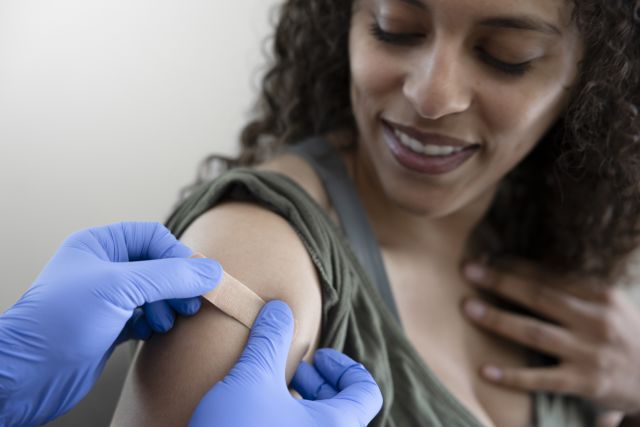Updated on March 4, 2025.
Everyone ages 6-months and older is advised to get a flu shot each year. But is this really that important to do? The short answer: yes. Here’s what you need to know about the flu vaccine and why flu prevention is so essential.
The flu can be dangerous—even deadly
The 2024-2025 flu season is already the worst in 15 years. As of February 22, there have been at least 37 million infections and 480,000 hospitalizations, according to the Centers for Disease Control and Prevention (CDC). The CDC also reports that at least 21,000 people in the United States have died from the flu, including 98 children.
Meanwhile, as of February 8, 146.8 million doses of flu vaccine have been distributed in the U.S., compared to 157 million doses at this point last year.
Experts believe the flu season may have peaked but flu activity remains high in 41 states. The CDC expects the virus to continue spreading for several more weeks.
Even during a less severe or typical season, flu still causes tens of thousands of deaths. Between 2010 and 2020, 140,000 to 710,000 people were hospitalized with the flu annually, according to CDC estimates. Each year during that 10-year time span, 12,000 to 51,000 people died from the flu.
But many people still think of the flu as a bad cold. This is not true.
Flu symptoms may seem like just a cold but they’re usually more intense and linger longer. The stress and strain the flu puts on the body can also lead more serious complications, including pneumonia, inflammation of the heart, or stroke. People with other health issues, such as diabetes, heart disease and lung disease are among those at greatest risk. Older people, pregnant people, and children are also at higher risk for flu-related complications.
Preventing the spread of the flu can not only keep you healthy, but also protect the vulnerable people around you. The best way to do that: Get a flu shot. And even now as the flu continues to spread, it’s not too late to get vaccinated.
What is the flu vaccine?
The precise formulations of the vaccine change every year, but the basic foundations of the vaccine remain constant. The shots are either made with flu viruses that have been inactivated, which means they’re not infectious, or they’re made without viruses at all (recombinant flu vaccines). This means that you can’t get the flu from any type of shot.
Depending on the year, both three-component (trivalent) or four-component (quadrivalent) vaccines may be available. Three-component vaccines defend against three types of flu virus: an influenza A (H1N1), another influenza A (H3N2), and an influenza B virus. The four-component vaccines protect against these same viruses, plus an additional B virus.
For the past two years, the flu vaccines were quadrivalent vaccines. For the 2024-2025 flu season, the flu shot is trivalent. It will offer protection against two A strains (an H1N1 and an H3N2), and one B strain (Victoria). This is because the additional B strain (Yamagata) has not been circulating in recent years.
Certain vaccines are licensed for use in specific age groups, such as children and people older than 65. Some groups of people are also not candidates for certain vaccines. Your healthcare provider (HCP) will recommend what is safe and appropriate for you, depending on your age, the health of your immune system, allergies, and other factors. For adults older than 65, higher-dose vaccines may be recommended since they are potentially more effective for people who have weakened immune systems than regular dose flu vaccines.
How is the flu vaccine selected?
Because the flu virus is constantly changing, researchers reevaluate the strains expected to be in circulation or spreading in communities each year. The exact components of the vaccine, therefore, may change from year to year. The World Health Organization (WHO) assembles a board of researchers from their own collaborating centers and other key laboratories—including the CDC and the Francis Crick Institute—to determine:
- Which viruses are making people sick
- How fast the viruses are spreading
- The effectiveness of the previous vaccine
Once this information has been presented and reviewed—usually in February of each year—the FDA makes the official vaccine decision for the United States. After that, manufacturing companies begin creating the vaccine, a process that usually takes about six months. Ideally, people in the U.S. should get their annual flu shot by the end of October.
In seasons when the vaccine is well-matched to most circulating influenza viruses, getting a flu shot may decrease the risk of needing medical care for the flu by 40 percent to 60 percent. The CDC estimates that during the 2022-2023 flu season, the flu shot prevented about 6 million cases of the flu, 2.9 million medical office visits, 65,000 hospitalizations, and 3,700 flu-related deaths.
Who needs the shot?
The CDC recommends that everyone ages 6-months and older get the flu vaccine.
The more people who are vaccinated, the fewer chances the virus has to spread. But vaccination is particularly important for people who are at higher risk for severe flu and flu-related complications. This includes:
- Children younger than 5
- Adults older than 65
- People with chronic health issues or a weakened immune system
- Residents of nursing homes or other care facilities
Pregnant people should also get the flu shot during and after pregnancy. It can greatly reduce the risk of complications and protect infants from illness for several months after birth. Babies younger than 6-months old are too young to be vaccinated but can still receive flu antibodies in the uterus, or before birth.
There are some rare exceptions to the flu vaccine recommendations. People younger than 6-months old should not receive the flu vaccine. Some people with a history of Guillain-Barré Syndrome (GBS) should also not get a flu shot. (Guillain-Barré is a rare disorder in which your immune system attacks nerve cells causing muscle weakness and sometimes paralysis. Most people recover.) Those who have ever had GBS should talk to their healthcare provider (HCP) to determine if the flu vaccine is right for them.
The flu shot is also not recommended for those who’ve had severe allergic reactions to it in the past, or people who are allergic to certain vaccine components like gelatin or some antibiotics.
Egg allergies may be an exception. Many flu vaccines are made using egg-based technologies, but most people with egg allergies can still receive the flu vaccine without needing to be observed for an allergic reaction. In fact, the CDC says those with egg allergy may receive “any vaccine (egg-based or non-egg-based) that is otherwise appropriate for their age and health status.” People who are concerned about a severe egg allergy should discuss their options with their HCP.
Timing the flu shot
People should get their flu shot before the virus starts to spread each year. In the U.S. flu usually beings to circulate in October and peaks between December and February.
The CDC recommends getting vaccinated by the end of October. Because children ages 6 months to 8 years who are getting vaccinated for the first time need two doses four weeks apart, it’s a good idea to begin their vaccination process even earlier.
But people can still get the flu as late as May.
And remember it takes two weeks to develop protective antibodies following immunization. This means that after you get a flu shot, it may take about two weeks for your body to gain protection against the flu. During that time, consider taking precautions against infections like the flu. This includes washing your hands well and often with soap and water and avoiding close contact with people who are sick, especially if you are at higher risk for flu-related complications.







